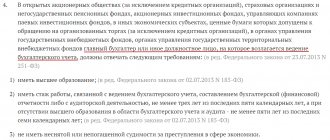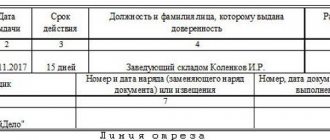When does the director have the right to sign papers for the chief accountant?
The accounting law states whether the general director can sign for the chief accountant - yes, the general director has the right to endorse documentation for the chief accountant (Part 1 of Article 7 402-FZ).
The head organizes accounting in the institution and has the right to sign all papers. These rights do not need to be further documented. This is confirmed by the legislation on joint stock companies and limited liability companies. The regulations stipulate whether the director has the right to sign documents for the chief accountant - yes, the general director, without a power of attorney, acts on behalf of the organization and in its interests (clause 2 of article 69 208-FZ of December 26, 1995, clause 3 of article 40 14 -FZ dated 02/08/1998). That is, the sole executor has the right to issue orders and sign any documentation of the organization, including accounting.
The General Director has the right to sign all organizational papers. The Civil Code stipulates whether the chief accountant can sign documents for the general - not always (Clause 1 of Article 845 of the Civil Code of the Russian Federation). The chief accountant has the opportunity to sign the invoice by proxy or order granting the right to sign. But the chief accountant does not have the right to sign financial and settlement documents - only the second signature is available to him. Payment orders and settlement papers are the first to be endorsed only by the general director (Instruction of the Central Bank of the Russian Federation No. 28-I dated September 14, 2006, letter of the Association of Russian Banks No. A-02/5-245 dated May 14, 2007, letter of the Central Bank of the Russian Federation No. 31-1-6/1244 dated June 14, 2007).
There is no liability for the absence of the chief accountant’s signature in cash documents.
Formally, the director does not have the right to issue such an order. But if he does this, and the cash documents do not contain the signatures of the chief accountant, there should still be no fine for such a violation.
The previous law on accounting equated monetary and settlement documents that did not contain the signature of the chief accountant as invalid and prohibited their acceptance for execution (Clause 3, Article 7 of Federal Law No. 129-FZ of November 21, 1996). In the Federal Law of December 6, 2011 No. 402-FZ “On Accounting” (hereinafter referred to as Law No. 402-FZ), which came into force on January 1, 2013, there really is no similar rule. But this in itself does not allow you to draw up cash documents in any order.
According to the general rules, the forms of primary documents are approved by the head of the organization (Part 4 of Article 9 of Law No. 402-FZ). However, this does not apply to documents whose forms are established by authorized bodies in accordance with and on the basis of other federal laws, including cash documents (information of the Ministry of Finance of Russia No. PZ-10/2012). Consequently, incoming cash orders must be drawn up only in the unified form KO-1, and outgoing cash orders - in the KO-2 form (approved by Resolution of the State Statistics Committee of Russia dated August 18, 1998 No. 88). These forms provide a signature line and the name of the chief accountant.
The specifics of drawing up cash documents are enshrined in the Regulations on the procedure for conducting cash transactions (approved by the Central Bank of the Russian Federation on October 12, 2011 No. 373-P, hereinafter referred to as Regulation No. 373-P). According to clause 2.1 of Regulation No. 373-P, cash documents of a legal entity are drawn up by:
- Chief Accountant;
- an accountant or other employee (including a cashier), determined by the manager in agreement with the chief accountant by issuing an administrative document;
- manager (in the absence of a chief accountant and accountant).
In this case, the cash receipt order is signed by the chief accountant or accountant, and in their absence, the manager, the cashier. And the expense cash order is the manager, as well as the chief accountant or accountant, and in their absence - the manager, cashier. In the case of conducting cash transactions and drawing up cash documents by the manager, cash documents are signed by the manager (clause 2.2 of Regulation No. 373-P).
As you can see, not only the chief accountant, but also an accountant or cashier can draw up cash documents if the director authorizes him to do so by order. But the signature of the chief accountant may be absent from these documents only in two cases. Firstly, if the staff does not have a chief accountant and therefore the manager himself draws up cash documents. Secondly, if instead of the chief accountant, an accountant signs for them. From this we can conclude that Regulation No. 373-P does not allow your manager to issue an order that he himself will sign incoming and outgoing cash orders and the signature of the chief accountant is not needed there.
If the director issues such an order and the cash documents contain only his signature and the signature of the cashier, there should still be no fine. An administrative fine in the amount of 40,000 to 50,000 rubles. for legal entities and in the amount of 4,000 to 5,000 rubles. for officials is provided for violation of the procedure for working with cash and the procedure for conducting cash transactions, which is expressed in:
— cash settlements with other organizations in excess of the established amounts;
— non-receipt (incomplete receipt) of cash to the cash desk;
— failure to comply with the procedure for storing available funds;
— accumulation of cash in the cash register in excess of established limits (Part 1 of Article 15.1 of the Code of Administrative Offenses of the Russian Federation).
As you can see, the list is closed, and it does not include a violation of the procedure for processing cash documents. This means that tax authorities do not have the right to fine the company and its officials during an audit for the fact that the receipt and expenditure cash orders do not have the signature of the chief accountant.
True, the presence of court decisions on this issue suggests that in practice the possibility of a fine is not excluded. But the judges are on the side of the companies (resolutions of the Federal Antimonopoly Service of the North-Western District dated 02/07/2011 No. A52-2365/2010, of the West Siberian District dated 02/05/2009 No. F04-491/2009(20357-A03-3), dated 01/29/2009 No. F04-374/2009(20085-A03-29)). The arbitrators in these decisions came to the conclusion that errors in the execution of cash receipt orders do not form the objective side of the administrative offense provided for in Part 1 of Art. 15.1 Code of Administrative Offenses of the Russian Federation. True, at that time the old Procedure for conducting cash transactions, approved by the Central Bank of the Russian Federation on September 22, 1993 No. 40, was in effect. But in this case this is not important. After all, paragraph 13 of this document also stated that cash receipt orders must be signed by the chief accountant. And the wording in Part 1 of Art. 15.1 of the Code of Administrative Offenses of the Russian Federation has also remained the same since then.
When will it be necessary to legitimize
402-FZ indicates whether an order is needed for the general director to sign for the chief accountant - no, if the general director or individual entrepreneur independently conducts accounting in the organization. If, according to the staffing table, the position of chief accountant is provided and he works in the institution, then the right to the second signature belongs to the financial specialist. In this case, two signatures must be placed on the documents.
This primarily concerns invoices and delivery notes. If an organization claims a tax deduction for VAT, it submits to the tax office original invoices with the allocated tax (clause 6 of Article 169 of the Tax Code of the Russian Federation, letter of the Ministry of Finance No. 03-07-09/42854 dated 08/27/2014). They are signed by both the general director and the chief accountant. If the director signed the invoice for the chief accountant when he actually exists in the institution, the tax authorities will send a request for clarification. The legality of the endorsement will confirm the order granting the right to sign.
There is another situation when the general director actually performs the functions of an accountant. In this case, with two identical visas on the invoice, the tax authorities have no reason to refuse the deduction (resolution of the Federal Antimonopoly Service of the North Caucasus District No. F08-6533/2008 in case No. A53-2656/2008-C5-14 dated October 29, 2008, resolution of the FAS North Caucasus District in case No. A53-17547/2008-C5-23 dated 06/03/2009).
How to legitimize
If the institution has a chief accountant, but the director signs documents for him, prepare an order granting the right to sign.
Here's how to draw up an order according to which the general director signs primary documents for the chief accountant:
- Indicate the name of the organization.
- Enter the basic details of the order - number, date, place of issue.
- Title the order.
- Describe the reason for issuing the order.
- Indicate the grounds for the transfer of powers - legislative norms.
- Determine the employee (director) to whom the authority to sign accounting papers is delegated. The visa is separately confirmed in the annex to the order.
- Sign the order from the manager and affix a stamp.
Sample order granting the director the right to sign for the chief accountant:
Download a free sample order from ConsultantPlus.
to read.
What to do if your document contains two visas
The authority to sign organizational documentation is determined by the constituent documents and orders. 402-FZ specifies what to do if the director and chief accountant are the same person, how to sign documents - it is required to issue an order stating that the general director takes over the accounting (clause 3 of Article 7 402-FZ).
In this case, there will be no problems with signing reports. Accounting reports are accepted if you have a manager’s visa (Article 13 402-FZ, Resolution of the Arbitration Court of the Far Eastern District No. F03-6116/2018 in case No. A73-8993/2018 dated 02/05/2019). The chief accountant does not sign the balance sheet and other final forms (Order of the Ministry of Finance No. 57n dated 04/06/2015). Only the general director signs the tax returns. And on the card of sample signatures for the bank, a dash is placed next to the details of the second person.
To whom is the right of the second signature transferred in the absence of the chief accountant?
If the manager has not given the right to sign documents to the chief accountant, then there will be no need to transfer this right to anyone in the absence of the chief accountant.
If the right of the second signature is granted to the chief accountant and secured by an order or power of attorney, the chief accountant’s departure on vacation or sick leave, going on a business trip or the presence of other grounds for his absence require additional actions from the manager - it is necessary to issue an order or issue a power of attorney for the right of the second signature to another person.
While, for example, on vacation, the chief accountant, who has the right of second signature on the payroll, does not have the right to sign this document. If the authority to sign has not been delegated to anyone, the chief accountant must be formally recalled from vacation to sign this document.
This conclusion follows from the general definition of rest time and “vacation” nuances:
- rest time is the time during which the employee is free from performing work duties and which he can use at his own discretion (Article 106 of the Labor Code of the Russian Federation);
- the vacation period is not considered working time (Article 107 of the Labor Code of the Russian Federation), the employee only retains his workplace during the vacation and the average salary;
- affixing a signature on documents is the performance of a labor function that is subject to payment in accordance with the employment contract.
Thus, in the absence of a chief accountant, the right of second signature on certain documents, secured by internal company regulations, must be delegated to another employee (financial director, senior accountant, etc.).
The release of the chief accountant, who has the right to sign, gives the enterprise the right to apply for an extension of the deadline for submitting documents or other information at the request of the tax authorities (Clause 3 of Article 93 of the Tax Code of the Russian Federation).









